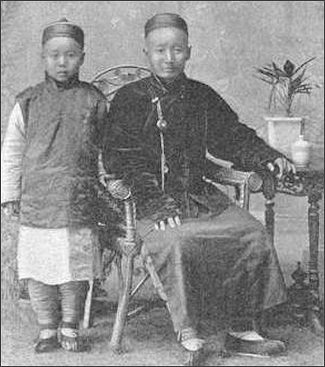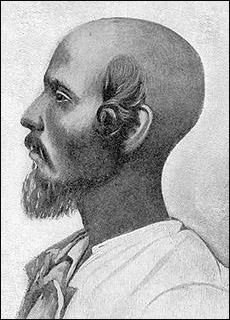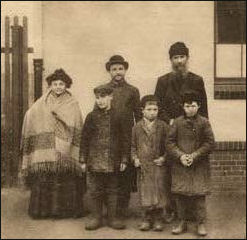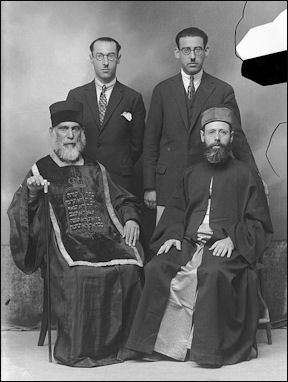Home | Category: Jewish Sects and Religious Groups / Judaism and Jews / Jewish Customs, Languages and Life / Judaism, Jews, God and Religion
JEWISH PEOPLE
Greek Romaniote Jews
The word “Jew” — or the more politically correct term “Jewish person” — can refer to a follower of Judaism or any person of Jewish parentage. The latter means anyone born of people who are identified as descendants of the group described in Biblical and post-Biblical sources as Jews. Absolute monotheism is the main tenet of Judaism. Religious practice consists primarily of following Jewish laws, the details of which are found in the Torah, the primary sacred text of Judaism, and other traditional literature, and which is interpreted by authorized religious leaders called rabbis. There are a lot of Jewish laws and rules. Orthodox Jews follow them as closely as they can. Non-Orthodox Jews are more selective in the laws they follow and don’t follow many of them, at least literally. [Source: Jacob Kat. International Encyclopedia of the Social Sciences, Encyclopedia.com]
Throughout their history Jews have often been seen as members of a "race," even though there are white, black, brown and Asian Jews. Jews prefer to think of themselves as a people or a nation. Nation does not necessarily mean in the the political sense of a country; the term can also be used to mean a people with a shared history and a similar vision of a future. In this way being Jewish can be viewed not as practicing a set of religious beliefs but rather as belonging to a culture. Even secular, nonreligious, atheist and agnostic Jews think of themselves as Jews. There are great differences in culture and beliefs among the various communities of Jews. All, however, share the core belief in one, eternal, nonmaterial, supreme God — even maybe not all of them believe in HIM
Before the creation of Israel, Jews generally spoke the language of their native country or region and tended to congregate in urban areas. Jewish communities established in rural communities tended to be very different from one another and often tended to be more like their non-Jewish neighbors than other Jews. Jewish community members have traditionally varied greatly in terms of wealth, education and influence. They ranged from wealthy bankers and merchants to humble artisans and poor shop keepers .
The Jews believe that they have a special covenant (promise with God) and are his Chosen People. The title of Chosen People does not connote a position of superiority rather it means they have the responsibility of passing on their knowledge about the one true God to other peoples of the world.
Websites and Resources: Judaism Virtual Jewish Library jewishvirtuallibrary.org/index ; Judaism101 jewfaq.org ; torah.org torah.org ; Chabad,org chabad.org/library/bible ; BBC - Religion: Judaism bbc.co.uk/religion/religions/judaism ; Encyclopædia Britannica, britannica.com/topic/Judaism; Yivo Institute of Jewish Research yivoinstitute.org ; Jewish History: Jewish History Timeline jewishhistory.org.il/history Jewish History Resource Center dinur.org ; Center for Jewish History cjh.org ; Jewish History.org jewishhistory.org ; Internet Jewish History Sourcebook sourcebooks.fordham.edu
RECOMMENDED BOOKS:
“To Be a Jew Today: A New Guide to God, Israel, and the Jewish People”
by Noah Feldman Amazon.com ;
“Living a Jewish Life: Jewish Traditions, Customs, and Values for Today's Families” by Anita Diamant, Howard Cooper, et al. Amazon.com ;
“Choosing a Jewish Life, Revised and Updated: A Handbook for People Converting to Judaism and for Their Family and Friends” by Anita Diamant, Barrie Kreinik, et al. Amazon.com ;
“A History of the Jews” by Paul Johnson, Amazon.com ;
“The Gifts of the Jews: How a Tribe of Desert Nomads Changed the Way Everyone Thinks and Feels” by Thomas Cahill Amazon.com ;
“The Antiquities of the Jews”
by Flavius Josephus, Allan Corduner, et al. Amazon.com ;
“The Jews: A History” by John Efron, Steven Weitzman, et al. Amazon.com ;
““The Origins of Judaism: An Archaeological-Historical Reappraisal” by Yonatan Adler Amazon.com ;
“"Early Judaism: A Comprehensive Overview" by John J. Collins and Daniel C. Harlow Amazon.com ;
“Essential Judaism: Updated Edition: A Complete Guide to Beliefs, Customs & Rituals”
by George Robinson Amazon.com ;
“Living Judaism: The Complete Guide to Jewish Belief, Tradition, and Practice”
by Wayne D. Dosick Amazon.com
Is It Okay to Use the Term “Jew” Rather Than “Jewish Person”
These days many people use the term “Jewish person” rather than “Jew”, and are even afraid to use “Jew” because it might be viewed as anti-Semetic. Ben Sales writes in the Washington Post: Why such aversion? “Jew” is not a slur. It is a descriptor most Jews will use without a moment’s thought. It’s just who we are. Derived from the Hebrew word “Yehuda,” the name of the foremost of the 12 tribes of Ancient Israel, it’s a cognate of the Hebrew word “yehudi,” which means Jew or Jewish. [Source: Ben Sales, Washington Post, Sales is a reporter for the Jewish Telegraphic Agency, October 5, 2020]
Of course, for as long as anti-Semitism has existed, people have used the word “Jew” as a pejorative. The most famous example is Nazi Germany, which made Jews wear yellow stars bearing the word “Jude,” German for “Jew.” William Shakespeare, Charles Dickens and other writers have called characters “Jews” — without meaning it as a compliment. As a verb, rather than a noun, it’s more obviously fraught: The phrase “to Jew down” unfortunately persists in some corners as a bigoted synonym for aggressively bargaining or cheating, based on the anti-Semitic stereotype that Jews are cheap.

Chinese Jews
Plenty of people, particularly non-Jews, avoid the word “Jew” for that reason, says Sarah Bunin Benor, who researches American Jewish language. “Many people assume that it’s a slur because they know that Jews are historically a stigmatized group, so they’re concerned about using it because they don’t want to sound offensive,” she said.
Jews were also once reticent to use the word “Jew” in describing themselves. Early generations of American Jews, sensitive to how non-Jews could think the word was a slur, opted instead for “Hebrew” or “Israelite” when they named their organizations. Those words harked back to a biblical heritage Christians could appreciate, says Eric Goldstein, a historian of American Jews. That’s why the country’s first association of Reform synagogues was initially called the Union of American Hebrew Congregations.
The American government used the word “Hebrew” as a way to identify Jewish soldiers as late as the 1940s. The dynamic shifted after the Holocaust, when, Goldstein says, when Jews worried “Hebrew” sounded too much like a racial category (and “Israelite” felt antiquated). Many postwar Jews were eager to assimilate into White America, and the 1955 book “Protestant, Catholic, Jew,” by Jewish author Will Herberg, argued that Jews should be seen as another religious group with equal claim to America, rather than as a different race or ethnicity.
Still, the word “Jew” does feel different, and somehow more powerful, than “Jewish.” “Jewish” is an adjective, one of many that could describe someone who may also be American, tall, athletic or anything else. “Jew” is not that. It’s an identity, something that speaks to the core of a person.
Of course, like other words that describe a minority, “Jew” can still be used offensively today if it’s intended to denigrate someone or to advance anti-Jewish stereotypes. A good tell, said Benor, is if the word “Jew,” a noun, is used as an adjective or a verb. Anti-Semites, for example, may refer to a “Jew banker” or use the expression “Jew down.” But “Jewish” can be used in anti-Semitic ways pretty easily, as well. Thomas Lopez-Pierre, an unsuccessful candidate for New York City Council, told me in 2017 that a cabal of “greedy Jewish landlords” was working with Israel to ethnically cleanse Harlem of people of color and that their misdeeds were being covered up by the Jewish media. In case it wasn’t clear, that’s a whole smorgasbord of classic anti-Semitic stereotypes. If we avoid saying “Jew” because anti-Semites might use it, we’re giving them veto power over a word that has defined us, in one language after another, for millennia. In fact, experts say, anti-Semites need not use the words “Jew” or “Jewish” at all to attack Jews.
For the complete article see 'Jew' isn't a slur. You don't have to avoid saying it. washingtonpost.com
Jewish Population Worldwide
There are about 15 million Jews worldwide (around 0.25 percent of the world’s population). By contrast there are around 1 billion Catholics and 1 billion Muslims worldwide. About six million of them live in the United States, around the same number that live in Israel. Jews live in more than 70 countries.
The world's core Jewish population was estimated at 14.31 million (around 70 percent of the world's "enlarged" Jewish population) in early 2015. Demographer Sergio DellaPergola proposed an "extended" Jewish population, including people identifying as partly Jewish and non-Jews with Jewish parents, that numbered 17.3 million globally, and an "enlarged" Jewish population figure that also included non-Jewish members of Jewish households and totals 20.2 million. Additionally, the total number of people who hold or are eligible for Israeli citizenship under the Law of Return — defined as anyone with at least one Jewish grandparent, and who does not profess any other religion — is estimated at around 23 million, of which 6.6 million are living in Israel as of 2015. Figures for these expanded categories are less precise than for the core Jewish population. [Source: Wikipedia]
While dozens of countries host at least a small Jewish population, the community is concentrated in a handful: Israel and the United States account for 83 percent of the Jewish population, while a total of 98 countries host the other 17 percent. With just over 6 million Jews, Israel is the only Jewish majority and explicitly Jewish state. Jewish population figures for the United States are contested, ranging between 5.7 and 6.8 million.
Arabs and Jews

Cochin Jew in India in the 1800s There were 850,000 Jews in the Middle East after World War II. After the creation of Israel in 1948, many Jews in Muslim countries emigrated there. Arab-Israeli wars and hostility towards Jews has reduced the numbers of Jews in the Arab world from around 1 million to around 6,000 today.
One Jew in Isfahan, Iran told National Geographic, "From the time of the Arab conquest, Jews have lived in relative peace with their overlords. Theoretically we have only had to pay a special tax, but in fact we have been made to feel in many ways like second-class citizens. Often we have been restricted to certain quarters of he a city, or limited to certain trades or kinds of dress. Here in Isfahan, for instance, we are still nor allowed in public baths."
Newspapers in Saudi Arabia, Egypt and other Arab countries run stories that allege that Jews used human blood to make pastries for the Jewish holiday Purim. For Passover treats “the blood of Christian and Muslim children under the age of 10 must be used.” Many say the blood is extracted with a “needle studded barrel.” Televison “documentaries” are based “The Protocols of the Elders of Zion,”which explains how Jews with the help American plan to take over the world.
The Somalia-born Islamic reformer Ayaan Ali Hirsi wrote in the New York Times, “Western leaders who say they are shocked by the conference of President Mahmoud Ahmadinejad of Iran denying the Holocaust need to wake up to that reality. For the majority of Muslims in the world. The Holocaust is mot a major historical event they deny; they simply fo not know because they were never informed. Worse, mst of us are groomed to wish for a Holocaust of Jews.”
Anti-Semitism has never been an element of Islam. Although Mohammed led a massacre of Jewish tribes that betrayed him, he never instigated violence against Jews and in fact regarded them as brothers of Muslims. Through history, Jews lived better under Muslim leaders than they did under Christian ones. It was only after the Jewish state of Israel was created in 1948 and Arabs were driven from their land that ant-Semitism took root in the Arab and Muslim world. Today, many Arabs see Jews as murderers and colonizers.
Who is a Jew
The definition of a Jew is hotly contested issue in Israel. Traditionally, children of Jewish mothers have been recognized as Jewish. Conservative Jews insist that this is not enough: a true Jew is someone who keeps Jewish law and obeys the commandments. "Whoever saves a single Jew,” reads the Babylonian Talmud. "Scripture ascribes it to him as though he had saved an entire world.”
Some groups also accept children of Jewish fathers as Jewish. American reformed Judaism recognizes patrilineal descent. The State of Israel grants citizenship under the law of return to people with a single Jewish grandparent. Conservative Jews Chas Chabadniks accept only the Talmudic rule that a Jew is anyone born to a Jewish mother, or someone who has undergone an Orthodox conversion and agreed to keep all 613 Jewish laws. A Jew traditionally can't lose his or her technical 'status' of being a Jew by adopting another faith, but they do lose the religious element of their Jewish identity. Someone who isn't born a Jew can convert to Judaism, but it is not easy to do so."
Gershom Gorenberg wrote in the New York Times, “Judaism, traditionally, is matrilineal: every child of a Jewish mother is automatically considered a Jew. Zvi Zohar, a professor of law and Jewish studies at Bar-Ilan University, told me that in Judaism’s classical view of itself, Jews are best understood as a “large extended family” that accepted a covenant with God. Those who didn’t practice the faith remained part of the family, even if traditionally they were regarded as black sheep. Converts were adopted members of the clan. Today the meaning of being Jewish is disputed — a faith? a nationality? — but in Israeli society the principle of matrilineal descent remains widely accepted. Sharon’s mother was Jewish, so Sharon knew that she was, too. And yet it seemed impossible to provide evidence that would persuade the rabbinate. [Source: Gershom Gorenberg, New York Times, March 2, 2008 **]
See Separate Article: JEWISH IDENTITY AND THE DEBATE ON CONVERSION AND WHO IS A JEW africame.factsanddetails.com
Jewish Character

Yiddish-speaking New York Jews Jews have a reputation for being rowdy, loud, loquacious, comical and homey. They value family, community, friendship, and education. They also value punctuality and try to never go back on their word.
Emphasis has generally been placed on respect to elders, traditional religion and conformity to social rules. Many Jews feel they were too passive during the Holocaust when they were led to the Nazi gas chambers “like sheep to the slaughter.”
Jewish humor is a fixture of early Woody Allen films and olf vaudeville routines. Among the people that are poked fun at are “kibitzers”, people who meddle in the affairs of others with useless advise. The stereotypical Jewish mother is overprotective, overbearing and overly involved in her children’s lives. She have been a a central figure in jokes, Yiddish theater and Woody Allen films.
One ancient rabbinical text teaches: “There are four types of people: The one who said: What is mine is mine and what is your is yours — this is the common type, but there are some who say that this is the type of Sodom. What is mine is yours and what is yours is mine — this is a bore. What is mine is yours — a saint. What is yours is mine — a villain.”
See Rituals and Practices
Image Sources: Wikimedia Commons
Text Sources: Internet Jewish History Sourcebook sourcebooks.fordham.edu “World Religions” edited by Geoffrey Parrinder (Facts on File Publications, New York); “ Encyclopedia of the World’s Religions” edited by R.C. Zaehner (Barnes & Noble Books, 1959); “Old Testament Life and Literature” by Gerald A. Larue, New International Version (NIV) of The Bible, biblegateway.com; National Geographic, BBC, New York Times, Washington Post, Los Angeles Times, Smithsonian magazine, Times of London, The New Yorker, Reuters, AP, AFP, Lonely Planet Guides, and various books and other publications.
Last updated March 2024

